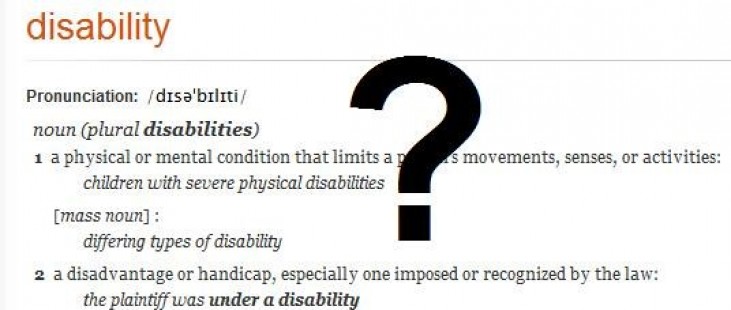
Disability, what’s that?
Journalist – Elizabeth Ransome – and publisher of the blog Inspire, questions whether the word disabled holds more meaning than it should?
Stop for a second before you read this article and ask yourself if the typical definition of the word disabled is a correct representation of reality. Some might argue that this is easily answered; according to the Oxford English Dictionary, disabled means a person with “a physical or mental condition that limits their movements, sense, or activities.” But is it really that simple and clear cut?
Have you heard of Eddie Kidd? Although Eddie is unable to talk and finds it difficult to walk, only being able to do so using a frame, he recently completed the 26 mile London Marathon. Perceived by some as an impossible task for someone with such disabilities, his inspiring achievement and pure determination leads us to question how the word disabled really applies to people.
A great number of those with disabilities do as much, if not more, than those without. Dynamic examples of this are co-editors Srin and Martyn, who both use wheelchairs. Not many can lay claim to having travelled to as many exotic locations, or flown a plane, or been scuba diving, like they have. Although someone with a disability might need to approach an activity in a different way, it doesn’t stop them from doing it. So, if someone does everything deemed ‘normal’ by society, wouldn’t they be called differently abled, not disabled?
Some might question whether anyone is really ever disabled themselves, or are they made so by society? For example, if a person in a wheelchair can’t reach a location because of a flight stairs, are they disabled, or is it society that is disabling them?
In line with this idea, “some people regard the use of the [word disabled] as dehumanizing because it tends to treat people with disabilities as an undifferentiated group, defined merely by their capabilities. To avoid offence, a more acceptable term would be people with disabilities” (Oxford English Dictionary). This simple twist of phrase means a person is transformed from being someone defined solely by their disabilities, to a person in their own right who just happens to have disabilities.
There too is the question as to whether anyone is disabled, or if they are just made so by society? A full explanation on this theory known as ‘the social model’ of disability is seen here. An example of this would be if a person in a wheelchair is unable to reach a location because of a flight of stairs, they are disabled, but is it society that is disabling them? If a person can achieve, but physical, attitudinal and organisational barriers are stopping them, surely they aren’t disabled themselves?
As with anything in life, it’s the way we look at it and approach it that defines us. What is important is how happy and comfortable a person is in their own lives and skin, doing whatever it is that makes them feel content. My brother, who had cerebral palsy and thus restricted mobility and understanding, was nevertheless the most inspiring and positive person I have ever known. Some life milestones considered important by society weren’t possible for him, but that was not what mattered, he was happy in the way he achieved and lived his life.
Sometimes a disability can shape who we are in a positive way. It can inspire and push us to try more, to be adventurous, and even to be open to opportunities that wouldn’t have been there otherwise. Confidence gives us an edge in life.
So what does disabled really mean? Well it’s certainly not a definition of who we are, and it’s clearly not a directive to how we should live our lives. It doesn’t stop us from pushing for achievement, whatever that may be, and creating new experiences.
At the end of the day, disability and disabled are just words, and what matters is what you want to achieve and what you believe you can do.
By Elizabeth Ransome
For articles by Elizabeth, check out the Inspire blog.